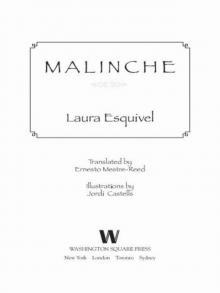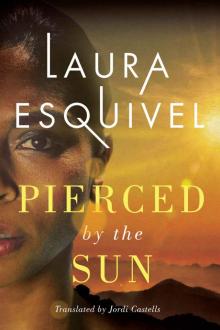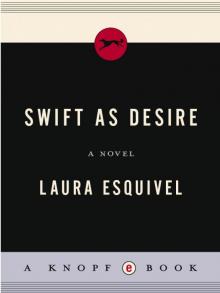- Home
- Laura Esquivel
Like Water for Chocolate Page 8
Like Water for Chocolate Read online
Page 8
Mary followed all this to the letter, but when she pulled the leeches from Peter’s arm he started to lose blood and the hemorrhage couldn’t be stopped. When “the Kikapu” heard the desperate screams coming from the house, she ran to see what was happening. As soon as she went to the sick man and placed one of her hands on his wounds, the bleeding stopped. His family was absolutely astounded. Then she asked if they would please leave her alone with the sick man. After what they had just seen, no one dared to say no. She spent the entire afternoon at her father-in-law’s bedside, singing strange melodies and applying curing herbs, wreathed in the smoke of the copal and incense she burned. It was well into night before the bedroom door opened and she came out, a cloud of incense surrounding her; behind her appeared Peter, completely restored.
After that, “the Kikapu” was their family doctor; within the North American community she was widely accepted as a miracle healer. John’s grandfather wanted to build a much larger room for her to carry on her investigations, but she didn’t want one. In the whole house she couldn’t have a better place than her little laboratory. In her laboratory, John had passed most of his childhood and adolescence. He stopped visiting it when he entered the university, because the modern medical theories he was learning there were in strong opposition to his grandmother’s theories, to everything he had learned from her. As medical research progressed, John remembered his grandmother’s teachings and the initiation she had given him in medicine. Now, after years of work and study, he had returned to her laboratory. He was convinced that only there would he find the most advanced medicine—if he could scientifically prove all the miracle cures Morning Light had accomplished.
Tita loved to watch him work. With him there were always things to learn and discover, like now, when he was making matches and conducting a class on phosphorus and its properties at the same time.
“Phosphorus was discovered in 1669, by Brandt, a Hamburg chemist who was looking for the philosophers’ stone. He believed that metal could be transmuted into gold by mixing it with extract of urine. Using this method, he obtained a luminous substance that burned with an intensity such as had never been seen before. For a long time phosphorus was obtained by vigorously heating the residue from evaporating urine in an earth retort the neck of which was submerged in water. Today it is extracted from the bones of animals, which contain phosphoric acid and lime.”
Talking didn’t make the doctor careless in his preparation of the matches. He had no trouble separating mental and physical activities. He could philosophize about even the most profound aspects of life without his hands pausing or making a mistake. While he was talking to Tita, he kept on making matches.
“Now that we have the phosphorus mixture, the next step is to prepare the cardboard for the matches. Dissolve a pound of potassium nitrate in a pound of water, stir in a little saffron to add color, and dip the cardboard in this solution. When it dries, cut the cardboard into narrow strips and place a little of the phosphorus mixture on the end of each strip. Allow the matches to dry, buried in sand.”
While the strips were drying, the doctor showed Tita an experiment.
“While phosphorus doesn’t combine with oxygen to burn at ordinary temperatures, it does burst into flame very rapidly at an elevated temperature; watch . . .”
The doctor placed a small amount of phosphorus in a tube that was closed at one end and full of mercury. He melted the phosphorus by holding the tube over the flame of a candle. Then, using a small bell jar containing oxygen, he transferred the gas to the jar very, very slowly. When the oxygen reached the top of the jar, where it encountered the melted phosphorus, an explosion occurred, brilliant, instantaneous, like a flash of lightning.
“As you see, within our bodies each of us has the elements needed to produce phosphorus. And let me tell you something I’ve never told a soul. My grandmother had a very interesting theory; she said that each of us is born with a box of matches inside us but we can’t strike them all by ourselves; just as in the experiment, we need oxygen and a candle to help. In this case, the oxygen, for example, would come from the breath of the person you love; the candle could be any kind of food, music, caress, word, or sound that engenders the explosion that lights one of the matches. For a moment we are dazzled by an intense emotion. A pleasant warmth grows within us, fading slowly as time goes by, until a new explosion comes along to revive it. Each person has to discover what will set off those explosions in order to live, since the combustion that occurs when one of them is ignited is what nourishes the soul. That fire, in short, is its food. If one doesn’t find out in time what will set off these explosions, the box of matches dampens, and not a single match will ever be lighted.
“If that happens, the soul flees from the body and goes to wander among the deepest shades, trying in vain to find food to nourish itself, unaware that only the body it left behind, cold and defenseless, is capable of providing that food.”
How true these words were! Nobody knew it better than she.
Unfortunately, she had to admit that her own matches were damp and moldy. No one would ever be able to light another one again.
And the saddest thing was that she knew what set off her explosions, but each time she had managed to light a match, it had persistently been blown out.
As if reading her thoughts, John went on:
“That’s why it’s important to keep your distance from people who have frigid breath. Just their presence can put out the most intense fire, with results we’re familiar with. If we stay a good distance away from those people, it’s easier to protect ourselves from being extinguished.” Taking one of Tita’s hands in his, he added simply, “There are many ways to dry out a box of damp matches, but you can be sure, there is a cure.”
Tita felt tears run down her face. Gently, John dried them with his handkerchief.
“You must of course take care to light the matches one at a time. If a powerful emotion should ignite them all at once they would produce a splendor so dazzling that it would illuminate far beyond what we can normally see; and then a brilliant tunnel would appear before our eyes, revealing the path we forgot the moment we were born, and summoning us to regain the divine origin we had lost. The soul ever longs to return to the place from which it came, leaving the body lifeless. . . . Ever since my grandmother died, I have been trying to demonstrate this theory scientifically. Perhaps someday I will succeed. What do you think?”
Dr. Brown remained silent to give Tita time to say something if she wished. But she was as silent as a stone.
“Well, I mustn’t bore you with my talk. Let’s take a break, but before we go, I’d like to show you a game my grandmother and I used to play. We spent most of the day here, and she taught me her secrets through games.
“She was a quiet woman, just like you. Sitting in front of her stove, her heavy braid wrapped around her head, she was always able to read my thoughts. I wanted to learn how to do it, so after much begging, she gave me my first lesson. She would write a sentence on the wall, using some invisible substance, without my seeing. When I looked at the wall at night, I would find out what she had written. Do you want to try it?”
From what he’d said, Tita realized that the woman she’d sat with so often was John’s dead grandmother. Now she didn’t need to ask him.
The doctor took a piece of phosphorus in a rag and gave it to Tita.
“I don’t want to break the rule of silence you have imposed, so as a secret between us, I’m going to ask you to write the reason you won’t talk on that wall over there as soon as I leave, all right? Tomorrow, I will divine the words before your eyes.”
What the doctor neglected to tell Tita, of course, was that one of the properties of phosphorus was that it would glow in the dark, revealing what she had written on the wall. He had no real need of this subterfuge to know what she was thinking, but he thought it would be a good way for Tita to start communicating with the world again, if only in writing. John could see she was re
ady. When the doctor left, Tita took the phosphorus and went up to the wall.
That night, when John Brown entered the laboratory, he was pleased to see the writing on the wall, in firm phosphorescent letters: “Because I don’t want to.” With those words Tita had taken her first step toward freedom.
Meanwhile, she was staring up at the ceiling, unable to stop thinking of John’s words: was it possible for her soul to stir again? With her whole being she wanted to believe that it was.
She had to find someone who could kindle her desire.
Could that someone be John? She was remembering the pleasant sensation that ran through her body when he took her hand in the laboratory. No. She wasn’t sure. The only thing she was absolutely sure about was that she did not want to return to the ranch. She never wanted to live near Mama Elena again.
TO BE CONTINUED . . .
Next month’s recipe:
Ox-Tail Soup
CHAPTER SEVEN
July
Ox-Tail Soup
INGREDIENTS:
2 ox tails
1 onion
2 cloves garlic
4 tomatoes
1/4 kilo string beans
2 potatoes
4 chiles moritas
PREPARATION:
The cut-up ox tails are placed in a pan to cook with a chunk of onion, a clove of garlic, and salt and pepper to taste. It is advisable to add a little more water than you normally would, since you are making a soup. A good soup that’s worth something has to be soupy without getting watery.
Soups can cure any illness, whether physical or mental—at least, that was Chencha’s firm belief, and Tita’s too, although she hadn’t given sufficient credit to it for quite some time. But now it would have to be accepted as the truth.
About three months ago, after tasting a spoonful of soup that Chencha had made and brought to Dr. John Brown’s house, Tita had returned to her senses.
She was at her high post in the window, looking through the glass at Alex, John’s son, who was chasing doves on the patio.
She heard John’s footsteps coming up the stairs. She was eagerly awaiting his customary visit. John’s words were her only link with the world. If only she could talk, tell him how much his presence and his conversation meant to her. If only she could go down to Alex and kiss him like the son she didn’t have, play with him until they were tired, if only she could remember how to cook so much as a couple of eggs, enjoy any kind of food, if only she could . . . return to life. She noticed a smell that struck her. A smell that was foreign to this house. John opened the door and stood there with a tray in his hands and a bowlful of ox-tail soup!
Ox-tail soup! She couldn’t believe it. And behind John, in came Chencha, covered in tears. The embrace they exchanged was brief, because they didn’t want the soup to get cold. With the first sip, Nacha appeared there at her side, stroking her hair as she ate, as she had done when she was little and was sick, kissing her forehead over and over. There were all the times with Nacha, the childhood games in the kitchen, the trips to the market, the still-warm tortillas, the colored apricot pits, the Christmas rolls, the smells of boiled milk, bread with cream, chocolate atole, cumin, garlic, onion. As always, throughout her life, with a whiff of onion, the tears began. She cried as she hadn’t cried since the day she was born. How good it was to have a long talk with Nacha. Just like old times, when Nacha was still alive and they had so often made ox-tail soup together. Chencha and Tita laughed reliving those moments, and they cried remembering the steps of the recipe. At last Tita had been able to remember a recipe, once she had remembered the first step, chopping the onion.
The onion and the garlic are chopped very fine and placed in a little oil to fry; as soon as they become transparent, the potatoes, beans, and chopped tomatoes are stirred in until the flavors meld.
John interrupted these memories by bursting into the room, alarmed by the stream that was running down the stairs.
When he realized it was just Tita’s tears, John blessed Chencha and her ox-tail soup for having accomplished what none of his medicines had been able to do—making Tita weep. Sorry to have interrupted, he started to leave the room. Tita’s voice stopped him. That melodious voice had not spoken a word for six months.
“John! Please don’t leave!”
At Tita’s side, John watched her go from tears to smiles as she heard all the news and gossip from Chencha. The doctor learned that Mama Elena had forbidden visits to Tita. In the De la Garza family some things could be excused, but not disobedience, not questioning parental authority. Mama Elena would never forgive Tita, crazy or not, for blaming her for the death of Roberto. She had forbidden anyone to even mention Tita’s name, just as she’d done with Gertrudis. Of course, Nicholas had returned recently with news of Gertrudis.
He had actually found her working in a brothel. He had delivered her clothes to her and she had given him a letter for Tita. Chencha gave it to her, and Tita read it to herself:
Dear Tita:
You can’t know how grateful I am that you sent me my clothes. Fortunately, I was still here to get them. Tomorrow I will be leaving this place, which is not where I belong. I still don’t know where that is, but I know that I have to find the right place for myself somewhere. I ended up here because I felt an intense fire inside; the man who picked me up in the field in effect saved my life. I hope to meet him again someday. He left because I had exhausted his strength, though he hadn’t managed to quench the fire inside me. Now at last, after so many men have been with me, I feel a great relief. Perhaps someday I will return home and explain it to you.
I love you, your sister Gertrudis.
Tita put the letter in the pocket of her dress without a word. The fact that Chencha didn’t ask her anything about the contents of the letter was a clear sign that she had already read it from one end to the other.
Later, the three of them, Tita, Chencha, and John, dried the bedroom, the stairs, and the bottom floor.
As they were saying good-bye, Tita told Chencha her decision never to go back to the ranch again; she asked her to tell Mama Elena. Chencha crossed the bridge between Eagle Pass and Piedras Negras for the hundredth time, without even realizing it, as she tried to think of the best way to break the news to Mama Elena. The watchmen for both countries let her do it, because they’d known her since she was a child. Besides, it was amusing to watch her go from one side to the other talking to herself and chewing on her rebozo. She felt as if her talent for invention had been paralyzed by terror.
Whatever version she gave, it was sure to infuriate Mama Elena. She had to invent one in which she, at least, got off scot free. To manage that she had to come up with an excuse that justified her visit with Tita. Mama Elena wouldn’t swallow just anything. As if she didn’t know it! She envied Tita for having had the courage to refuse to go back to the ranch. She wished she could do the same, but she didn’t dare. She’d heard talk since she was a child about the bad things that happen to women who disobey their parents and masters and leave the house. They end up in the filthy gutter of a fast life. Nervous, she twisted her rebozo around and around, trying to squeeze out the best of her lies for this situation. It never failed. When the rebozo was turned a hundred times, a tale that fit the occasion always came to her. For her, lying was a survival skill that she had picked up as soon as she had arrived at the ranch. It was better to say that Father Ignacio had sent her to collect alms than to confess she had spilled the milk by chatting in the market. The judgment earned by the two stories was completely different.
Anything could be true or false, depending on whether one believed it. For example, nothing she had imagined about Tita’s fate had proved to be true.
All these months she had been tormented thinking of the horrible things happening to Tita away from her kitchen. Surrounded by lunatics screaming obscenities, confined in a straitjacket, eating God knows what awful food away from home. She imagined that the food in a lunatic asylum, a gringo one to bo
ot, must be the most disgusting in the world. Whereas in fact she’d found Tita looking pretty good, she’d never set foot in a nuthouse, she’d clearly been treated well in the doctor’s house, and she hadn’t been fed too poorly, since she looked to have put on a few pounds there. Still, no matter how much she had eaten, no one had given her anything like the beef-tail soup. That’s one thing you can be sure of, or else why would she have cried so hard when she ate it?
Poor thing, surely now that she had left, Tita would resume weeping, tortured by memories, the thought that she would never again cook alongside Chencha. Yes, surely she was suffering deeply. Chencha could never have pictured Tita as she was then, radiant in a shiny moire-inlaid satin dress, dining by moonlight and listening to a declaration of love. That would have been too much even for Chencha’s feverish imagination. Tita was sitting by a fire roasting a marshmallow. Beside her John Brown was proposing marriage. Tita had agreed to accompany John under a half moon to a neighbor’s ranch to celebrate the neighbor’s discharge from military service. John had given her a beautiful dress he had bought for her in San Antonio, Texas, some time ago. Its multicolored fabric reminded her of the doves’ plumage, the feathers around their necks, but without any sad associations with the distant day when she had shut herself in the dovecote. In fact, she felt completely recovered, ready to start a new life at John’s side. They sealed their engagement with a gentle kiss on the lips. Tita didn’t feel the same as when Pedro had kissed her, but she hoped that her spirit, which had been dampened for so long, would eventually be kindled by the presence of this wonderful man.
Finally, after walking for three hours, Chencha had the answer! As always, she had come up with the right lie. She would tell Mama Elena that she’d been passing through Eagle Pass and had seen a beggar on the street-corner, dressed in filthy, tattered clothes. Moved by pity, she had gone over to give her a coin and had been shocked at the discovery that the beggar was Tita. She had escaped from the lunatic asylum and was roaming the world to pay for the crime of having insulted her mother. Chencha had invited her to come back home, but Tita had refused. She didn’t feel she deserved to return and live with such a good mother, and she had asked Chencha to please tell her mother that she loved her dearly and would never forget how much she had always done for her, and she promised that as soon as she became an honest woman she would return to be with her mother and give her all the love and respect that Mama Elena deserved.

 Like Water for Chocolate
Like Water for Chocolate Malinche
Malinche Pierced by the Sun
Pierced by the Sun Swift as Desire
Swift as Desire![[2013] Pierced by the Sun Read online](http://i1.bookreadfree.com/i2/04/10/2013_pierced_by_the_sun_preview.jpg) [2013] Pierced by the Sun
[2013] Pierced by the Sun